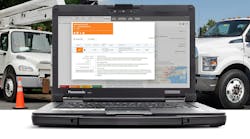Yeah, it's a boring term and one much abused by corporate jargon-meisters, but “customer service” is a huge issue in the world of trucking — especially for medium-duty fleets that deliver goods to stores and homes across the country every day.
For many of these fleets, in fact, the level of customer service determines whether this will be the first of many visits to a particular customer — or the last.
Here's an example from my own backyard, literally. In preparation for a move to a new home, my wife and I contacted Interstate Worldwide, a moving company located just up the road from where we live.
Here's why we wouldn't hesitate to be repeat customers (although we really, really hope that's not in our future).
First off, Jean Smith, a moving consultant for Interstate Worldwide, did an on-site inspection of the house we were moving out of and quoted us a price in simple language and with a smile. And also put it in writing.
On moving day, a crew of three showed up at our door (on time): crew chief Deon, followed by Dave and Tim. All were dressed in uniforms — talk about a rare event these days — and all were unfailingly polite to my wife and me.
After a hard day's work, Deon said “thank you for your business” and departed with his crew. Two days later, we noticed that a small part of our baby's crib was missing. We notified the moving company and they quickly sent out a check to cover the cost of the replacement part. End of story.
It sounds hokey, sure. But who do you think we'll recommend to friends when they need a moving company?
“Drivers in this kind of environment are on their own, but they also represent their companies to the customers they deliver to,” Manuel Nito, vp-fleet services for food and facilities management provider Aramark, told me recently. “We have 3,500 people out on the road every day, but we don't call them drivers. We call them route service representatives, or RSRs, simply because the customer service component of their job is so important.”
Just like moving companies, Aramark depends on the performance of its drivers to do more than meet current customer needs.
“They can't have a ‘pick-up/drop-off’ mentality. They're in contact with 100 customers on average per week. We need them not only to serve those customers, but attract new customers and new business, too,” he said. “It's a hard job, because they need all the professional driving skills that go with operating a truck, as well as the sales and service skills that go with interacting with customers. And they need a strong work ethic to get it all done.”
Nito admits that only “unique people” can fit into the role of an RSR. “Balancing the customer service, sales, and driving skills all at once is the toughest challenge these folks face. But it's also the area that draws out and appeals to the high performers,” he said. “It's a hard job physically and mentally at times, but it's where you'll find some of our best people.”
Even though the shipping community increasingly views customer service as a commodity, it's an issue that never really goes away in trucking circles.
“Price is always an issue, but the key is service,” Carolyn Gable, founder, president and CEO of New Age, a firm that manages the transportation, distribution and warehousing of inbound and outbound freight, told the Chicago Sun-Times in an interview last year.
To me, that really sums it up. No matter how good your mechanics or equipment are, if you don't have good customer service, you won't have enough business to keep the wheels turning.


